- Home
- Sarah MacLean
A Duke Worth Falling For Page 7
A Duke Worth Falling For Read online
Page 7
He laughed at her affront. “I beg your pardon.”
“You’d better,” she said, feigning seriousness before looking back at the house. “How many rooms are there?”
“One hundred and forty.”
“Good lord.”
It was ridiculous. “The family lives in about twenty of them. The rest is open to the public.”
She nodded, returning to their walk. “I took the tour.”
His brows shot up. “You did?”
“I did! The morning after we met.”
“I could have given you a tour,” he said, suddenly embarrassed and frustrated that she’d been in his home and he hadn’t known.
Neither had she.
Embarrassed and frustrated and guilty.
“You didn’t exactly bring me a basket of baked goods when I arrived, Max.”
“I saved you from Mabel.”
“Okay, first, I think Mabel and I would have worked it out,” she said with a laugh. “And second, I’m guessing that the lovely elderly woman who gave the tour probably knew more about the portrait gallery than you did.”
The portrait gallery filled with portraits of his ancestors.
“Although she really wanted to talk about the duke.”
He snapped his head around to look at her. “She did?”
“Oh yes. According to Judy, not only is he a billionaire, he’s quite dishy and unmarried.”
She said the last in a perfectly theatrical British accent. Max’s cheeks warmed. “Mmm.”
Lilah waved a hand in the air. “Unfortunately for all of us sad singletons, however, he’s also very secretive and nursing a legendary broken heart.”
“What rubbish,” he scoffed. Who was this Judy woman?
She shrugged. “I don’t know, I thought it was a pretty nice way of getting around the fact that he probably loathes having to mix with the masses. She really sold it. I confess, I was about ready to go Lizzie Benneting around to see if I could find him in the lake.”
Right. He wouldn’t sack Judy.
“Careful,” he said. “If you found me in the lake, I’d do more than Mr. Darcy you.”
She turned a delicious smile on him. “Promises, promises.”
He kissed her, lingering at that smile. “Unfortunately, we don’t have a lake handy.”
She shook a head. “What even is the point of having an English country house if you don’t have a lake?”
“I don’t know. You should ask Judy the next time you take the tour.”
“Okay, I give,” she said, threading her arm through his. “Regale me with tales of Salterton Abbey.”
“What do you want to know?”
“You have an apartment in the main house?”
“I do.” Tell her.
Tell her, and lose every moment of those six days of happiness.
“You see? And Judy said nothing about the hot farmhand.”
“Land steward, actually,” he corrected. It was the truth. Just not all of it. “But let’s get back to me being hot.”
“No. If we do that, I’ll never see the folly.”
That much was true.
“What’s it like living in something . . . Versailles-sized?”
He turned wide, affronted eyes on her “Versailles! Please. Balmoral. Windsor. But not French.”
She laughed, bright and beautiful. “I’m so sorry to offend. Please don’t tell your boss. I wouldn’t want him to kick me out.”
He resisted the urge to flinch. “He wouldn’t, you know.”
“I’m happy to hear it,” she retorted. “Do you know how hard it is to find a good hotel room on short notice? I’d have to convince Simon to let me stay at the Fox and Falcon.”
“First, you are not staying anywhere near Simon.”
Her brows rose. “What’s wrong with Simon?”
“He’s a bounder and a cad,” he said without hesitation. “And besides, you’re allowed to stay as long as you wish.”
“Even if the duke knew I compared his castle to Versailles?”
“Even then.”
“Ah. He’s the good kind of duke, then?”
He looked away. “He tries to be.”
Except for now. He can’t seem to be the good kind of man right now. Not when it means losing the pleasure you’ve promised him.
They walked in silence for a while, waving to a young family who had come to the estate for a wander. An older girl was attempting to teach a little one how to do a cartwheel, and Lilah slowed to look, giving Max time to watch her.
To wonder what it would be like if she were his to watch, always.
When the little one toppled over almost instantly, Lilah chuckled, and the woman with them looked over with a smile and a shrug.
“I like that the estate is public,” Lilah said as they resumed their journey.
“I do too.” Max waved to the family from a distance. “I like that it belongs to residents of and visitors to Salterton as much as to the title,” he said, repeating his father’s words, repeated from his grandfather.
“But not to photographers,” she said, teasing.
One side of his mouth lifted. “We make an exception for hot ones.”
She grinned. “So I’m hot now, too?”
“Shall I show you how much?”
He reached for her, but she slipped from his fingers with a laugh. “No deal, Lancelot. I was promised a folly. Tell me more. You’ve lived here your whole life, you said.”
“Yes.” The truth.
“Family business?”
“Mmm,” he said, hating the non-answer.
She shook her head. “Wild. And you never thought about leaving?”
“I did leave, for a while.”
She understood instantly. “The fallen-apart marriage.”
“The very same.”
They walked for a bit longer, and Max was grateful that Lilah didn’t pull away from him. He wanted to tell her this truth—even if he didn’t want to tell her all of it.
And she waited for him.
“We were young and in love,” he started, surprising himself with the words. “But I’d lived here my whole life and she’d spent her life in London. She didn’t want sheep and hay and lazy evenings down the pub. And I didn’t want the city, the parties, the people.” He’d never told anyone the rest. “I thought I could love her enough to get her to stay. And Georgiana thought she could love me enough to get me to leave.”
She nodded. “You were on different paths.”
Just as we are.
He’d seen the longing on her face when she’d talked about her work in that world—Christ, she’d taken photos of presidents and princes and superstars—and he could see how much she wanted to get back to it every time she lifted her camera to her eye.
Could see, too, that someone had taken it from her. He’d seen that look before on a woman he loved. Disappointment and sadness and something worse. Regret.
He’d never be someone’s regret again.
Lilah would never have cause to regret Max. She would leave in less than a week, none the wiser as to his title, and he would remain a lovely, satisfying interlude in her long and interesting life—a happy memory. He could hope for that. He could be that.
Because she would leave. And he would stay. And that was where this story ended.
“How long were you married?”
He looked out toward the tower, just visible at the center of a copse of trees on the next rise. “We met at eighteen. Married at twenty-three. Divorced at twenty-six.”
“Wow,” she said, softly.
“My greatest failure,” he said.
“Please. You were young and in love and believed it was enough. We all do stupid things for love at twenty-three.”
He looked at her, appreciating the matter-of-fact way she said it. Like it was true. “What did you do?”
“I went to art school, Max. About the only stupid thing I didn’t do is get married to the wrong person, and honestly th
at was only because I was falling for a different wrong person every week.”
The confession freed Max. “And do you still do that?”
“What, fall for the wrong person?”
“Mmm.”
“Ask me in six days,” she teased, not looking at him. Instead, she took in the wide expanse of Weston lands, but Max missed the vista with its enormous rolls of baled hay dotting the fields, lush wood in a riot of color, and the house itself in the distance.
He was too busy watching Lilah, more breathtaking than the land beyond.
“Growing up here must have been amazing,” she said, pulling him from his thoughts.
“It was,” he agreed. “Summers, when we were home from school—Simon and I . . . we’d spend every minute of daylight exploring.”
She smiled. “Bounders and cads in training?”
“He was the bounder and cad.”
“And you? Scoundrel and rogue?”
“In training. How did I do?”
She tilted her head. “Terrible.”
“I shall endeavor to try harder.”
“See that you do,” she said before adding, “And what about other kinds of friends?”
He slid her a look. “What other kinds of friends?”
“Girls, Max,” she said, as though speaking to a small child. “What about girls?”
They were nearing the top of the rise, closing in on a cluster of trees that had been there for two hundred years. “I’m familiar with the concept.”
She laughed. “I bet you were a heartbreaker.”
“I did all right.”
“Tell me about your first kiss.”
He stopped in his tracks. “I most certainly will not.”
She burst out laughing. “That was the most British you’ve ever sounded! Are you afraid you’ll ruin her reputation?”
“A gentleman would never.”
Lilah grinned. “Surely there’s a statute of limitations on kissing and telling.”
“How long would you say that is?”
“Twenty years,” she said, all certainty.
“Fair enough. Her name was Claire, we were ten, and it was very fast because we were absolutely certain we were about to be discovered by the vicar.”
“The vicar!”
“The vicar. We only ever saw each other after services on Sunday mornings.”
She made a show of looking shocked. “Kissing behind the church hedgerow is scandalous, Max.”
“It wasn’t behind the hedgerow; it was in the graveyard.”
Lilah’s pretend shock disappeared. “Wow. I’m honestly impressed. And a little jealous. My first kiss was in the back row of my high school auditorium with Brock D’Avino during rehearsal for the school musical.”
“Young Brock deserved a talking to, no doubt.”
“Well, I can’t remember anything about him but his name, so I don’t think it was very memorable. The point is, it wasn’t anywhere near as interesting as a graveyard.”
He winced. “Don’t say it like that. Makes it seem really grim.”
“Sunday morning cemetery snogging is better?”
“I wouldn’t exactly call it a snog.”
“Chaste smooching.”
He chuckled. “Better.”
They walked for a bit longer, and Lilah asked, “So, what happened to Claire?”
“Living quite happily in London with her partner and twin girls, last I heard.”
“Too bad.”
He cut her a look. “Not so bad.” Suddenly, nothing in his past felt bad. None of it could, if it had led him here, to this. To her, beautiful and fresh-faced and him, here, now. If just for a moment. And if six days of her was all he ever got, it would be enough.
Lie.
She stilled, pulling him around to face her, and he read the understanding in her eyes. The desire in them—a desire he recognized because it was his as well. “No,” she agreed, softly. “Not bad at all.”
She came up on her toes to meet him as he dipped his head and they kissed, and he didn’t want it to stop, soft and sweet and full of pleasure.
When they broke apart, Lilah’s eyes remained closed for a heartbeat, and Max took the moment to drink her in, warm and sun-kissed, a dusting of freckles across her cheeks, where her dark lashes lay. And then she whispered, “If I’m not careful, I’m going to like you more than six days’ worth.”
He already liked her too much.
He swallowed the realization, grateful that they’d arrived at their destination. The little tower stood a few yards away now that they were at the top of the ridge. Clearing his throat, he waved a hand in its direction. “The folly. As requested.”
8
It was perfect. A little stone tower, complete with arched windows and a rooftop parapet, made to look like a tiny medieval castle out here in the middle of nowhere.
Lilah let out a little gasp of excitement. “Can we go in?”
“Of course. What good would it be otherwise?”
She didn’t need to be told twice. There was nothing inside—the small door led to a staircase, winding around a great central column to the roof. In the doorway, she turned back to Max, still outside, still watching her. “Are you coming?”
He followed as she made her way up the winding stairs, catching up to her when she stilled on the small platform halfway up the tower to look out the tall, narrow opening there, the breeze whispering through the arch, cool and crisp. Atlas was already bounding off into the distance, released from herding humans for a while.
She lifted her camera and took a picture a thousand other people must have taken. She didn’t care. It wasn’t for the world. It was for her.
To bring her back, when it was over.
“The view is better from the top,” Max said, the low rumble curling through her.
He was right.
Coming through the small doorway at the top of the turret, Lilah walked to the edge, nothing in the world able to stop her. Camera in hand, she set her bag down at the base of the tower wall, peeking over, surveying the land. “This is like the greatest tree house ever. Did you play here as a kid?”
“It’s an excellent hiding place, if you are ever looking for one. Visitors never come this far north, and everyone on the estate forgets it exists.”
She shook her head. “England is real wild.”
He laughed. “Americans love a castle.”
“And what’s wrong with that?” she tossed over her shoulder. “I, for one, feel like the heroine in a romance novel,” she said. “Out on the ramparts, watching for soldiers coming home from battle.”
“Mmm,” he said, wrapping an arm around her waist and pressing a kiss at the place where her neck met her shoulder. “I like the idea of coming home from battle to you.”
She turned in his arms as his touch and words warmed her. “Mmm,” she repeated, teasing. “Maybe I’d like to come home from battle to you on the ramparts.”
“Waiting to warm you by the fire?” His tongue swirled against her pulse. “No. We go to war together.”
“Sword in your sheath, blade in my kirtle?” She sighed.
“Sounds proper filthy. Let’s do it.”
She laughed and pulled away from him, finding the sunlight on his face, his eyes bright and warm with pleasure and teasing, and the sound trailed off. “My God, Max. You’re so pretty.”
He dipped his chin at the words, and she loved that she’d embarrassed him.
“Let me take your picture.”
His attention immediately returned to her, his brow furrowed, like he didn’t know what to say.
“I’ll be gentle,” she said with a smile. “You won’t feel a thing.”
He laughed and rubbed a hand back and forth at the back of his neck. “I don’t know anything about being a model.”
She shook her head. “No modeling necessary. I just want—”
I want to remember you.
Lilah swallowed around the thought, hating the tightness
in her chest. “I just want to take a picture of you, here. With the land you work behind you. With the sun that loves you on your skin.”
“Only if I am able to take a picture of you at the end.”
“You drive a hard bargain, but I accept. And you will be very, very disappointed to know that I do not photograph well.”
“I don’t believe it.”
“It’s true,” she said, lifting the Nikon, watching him in the viewfinder as she joked, “Mine’s the kind of beauty that moves.”
He laughed.
Click.
“I wasn’t ready.”
“You were perfect,” she said, immediately reframing.
He hesitated.
Don’t blink.
There.
Click.
“You’re perfect,” he said.
The words sent a shot of pure pleasure through her. She lowered the camera, wanting to remember this moment, his eyes on her, seeing her in a way no one had ever seen her. She swallowed, her heart pounding. She was excited. Nervous.
Photographing Max, here, felt like she was taking pictures for the first time.
“Are you sure you don’t model on the side, farmhand?”
“I’ve been practicing for my new Instagram account.”
Click. That sly smile.
She laughed. “Too few piglets.”
Click. And the easy one, like home.
Click. Watching her. Not posing.
“You love this.”
On autopilot, Lilah readjusted her grip, moving with the light, backing away. Considering the angle of the shadows behind him as they lengthened in the afternoon sun. “It’s all I’ve ever wanted to do. Since I was a kid and my dad dug an old Polaroid camera out of a box in the attic and let me have it.” She paused. “Did you ever play with one of those?”
Click. Memory.
“I don’t think we ever had one.”
“I loved them. The picture would appear like it was coming through fog. It felt like magic. My dad bought up as much instant film as he could find at yard sales and thrift shops. And I took about twelve thousand pictures of the cat.”
Click. The handsomest of grins.
“How old were you?”
“Seven or eight,” she said, lowering the camera. “After the cat, I turned to portraits. My parents, my friends, my teachers, strangers. We took a summer vacation to the Outer Banks and I convinced a dozen people in line for ice cream to let me photograph them.” She shook her head, stuck in the memory. “My poor mother. She didn’t know what to do with me. But I still remember that when we developed that roll of film—she turned to me and said, in her thickest Georgia drawl, ‘Well, Lilah Rose, I suppose you’re going to be an artist.’”

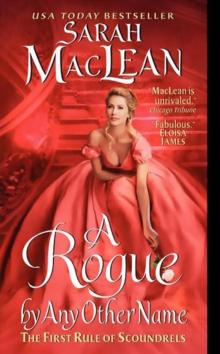 A Rogue by Any Other Name
A Rogue by Any Other Name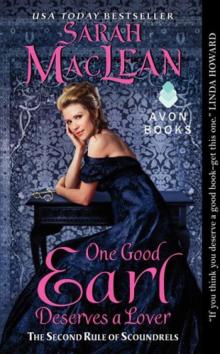 One Good Earl Deserves a Lover
One Good Earl Deserves a Lover Ten Ways to Be Adored When Landing a Lord
Ten Ways to Be Adored When Landing a Lord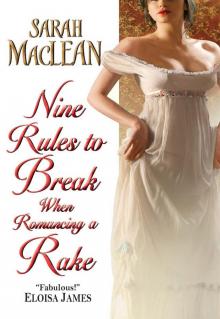 Nine Rules to Break When Romancing a Rake
Nine Rules to Break When Romancing a Rake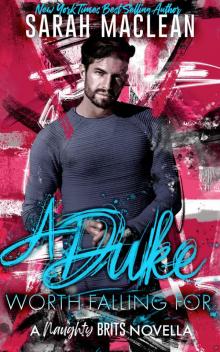 A Duke Worth Falling For
A Duke Worth Falling For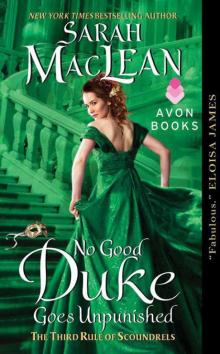 No Good Duke Goes Unpunished
No Good Duke Goes Unpunished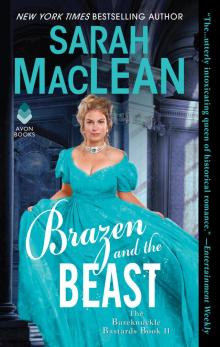 Brazen and the Beast
Brazen and the Beast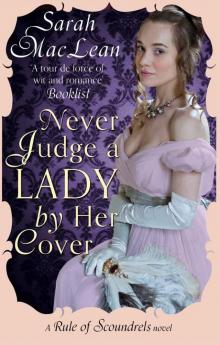 Never Judge a Lady by Her Cover
Never Judge a Lady by Her Cover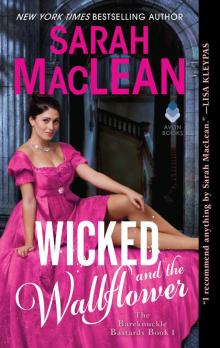 Wicked and the Wallflower
Wicked and the Wallflower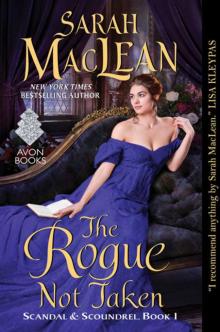 The Rogue Not Taken
The Rogue Not Taken Bombshell
Bombshell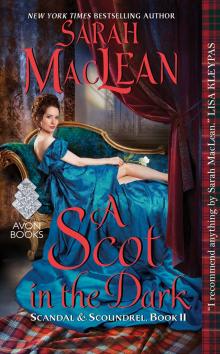 A Scot in the Dark
A Scot in the Dark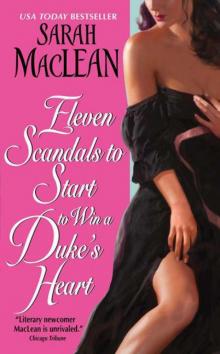 Eleven Scandals to Start to Win a Duke's Heart
Eleven Scandals to Start to Win a Duke's Heart Naughty Brits: An Anthology
Naughty Brits: An Anthology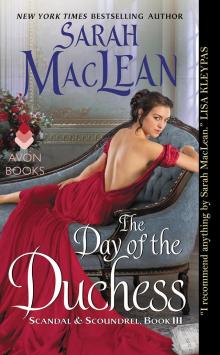 The Day of the Duchess
The Day of the Duchess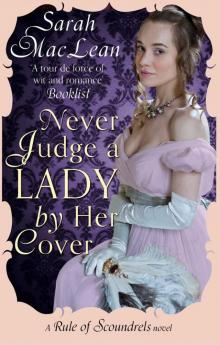 Never Judge a Lady By Her Cover: Number 4 in series (The Rules of Scoundrels series)
Never Judge a Lady By Her Cover: Number 4 in series (The Rules of Scoundrels series)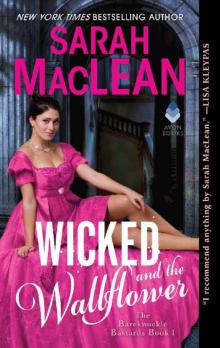 Wicked and the Wallflower: Bareknuckle Bastards Book 1
Wicked and the Wallflower: Bareknuckle Bastards Book 1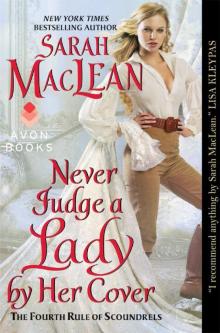 Never Judge a Lady by Her Cover_The Fourth Rule of Scoundrels
Never Judge a Lady by Her Cover_The Fourth Rule of Scoundrels